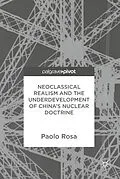Paolo Rosa is Professor of Political Science at the School of International Studies of the University of Trento, Italy. He is an associate of the EU Non-proliferation Consortium. His main research interests include Foreign Policy Analysis, Italian Foreign and Military Behaviour, Chinese Politics, Strategic Culture, Quantitative Analysis of Conflicts, and Peace Research.
This book addresses the under-researched discourse of the evolution of Chinese nuclear posture, and in particular, explains the absence from this evolution of a coherent and well-defined operational doctrine. Using a neoclassical realist framework, the book explains why China, after having launched a crash programme in the mid-1950s to develop a nuclear deterrent, did not debate a clear operational doctrine with respect to targeting and employment until the mid-1980s.
Autorentext
Paolo Rosa is Professor of Political Science at the School of International Studies of the University of Trento, Italy. He is an associate of the EU Non-proliferation Consortium. His main research interests include Foreign Policy Analysis, Italian Foreign and Military Behaviour, Chinese Politics, Strategic Culture, Quantitative Analysis of Conflicts, and Peace Research.
Zusammenfassung
This book addresses the under-researched discourse of the evolution of Chinese nuclear posture, and in particular, explains the absence from this evolution of a coherent and well-defined operational doctrine. Using a neoclassical realist framework, the book explains why China, after having launched a crash programme in the mid-1950s to develop a nuclear deterrent, did not debate a clear operational doctrine with respect to targeting and employment until the mid-1980s.
Inhalt
1. Introduction: Competing explanations for the underdevelopment of China's nuclear doctrine
1.1. The underdevelopment of China's nuclear doctrine 1.2. Existential deterrence and minimum means of reprisal 1.3. Traditional strategic culture and the art of ambiguity 1.4. Maoist military thought and the downplaying of military technology 1.5. Organization of the book
2. A neoclassical realist approach to military doctrines
2.1. Military doctrine and nuclear doctrine 2.2. International source of military doctrine: The balance of power model 2.3. Domestic sources of military doctrine (1): The organisational model 2.4. Domestic sources of military doctrine (2): Strategic cultures 2.5. A neoclassical realist framework of China's nuclear doctrine formation
3. China's nuclear programme: Origins and progress
3.1. Mao and the Bomb 3.2. The development of the programme 3.3. The doctrine of no-first-use
4. Nuclear doctrine as a continuation of factional politics by other means, 1964-1971
4.1. The international situation: the Indochina war, the Soviet threat and the 1969 military clashes 4.2. The domestic environment: Politics in command 4.3. The strategic debate during the Cultural Revolution: Factions and foreign policy attitudes 4.4. The impact on nuclear doctrine: Lack of operational concepts
5. Elite stability and nuclear doctrine formulation, 1978-1989
5.1. The international situation: The Vietnam lesson, the Soviet invasion of Afghanistan, and the SDI 5.2. The domestic environment: Deng, elite stability and military modernization 5.3. The strategic debate: People's war under modern conditions 5.4. The impact on nuclear doctrine: Considering limited nuclear war-fighting options
6. Conclusions
